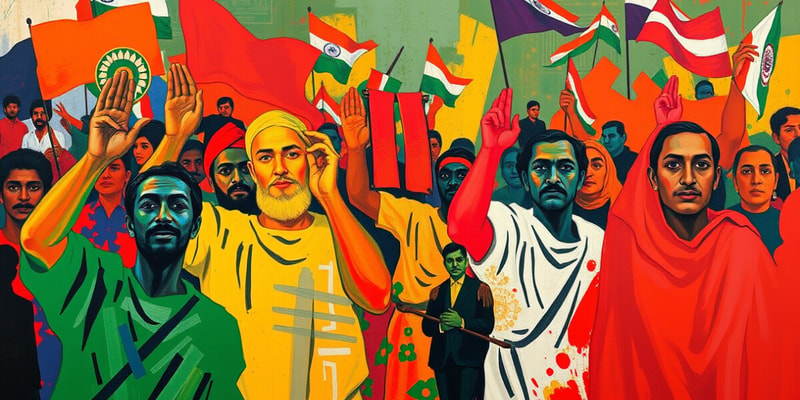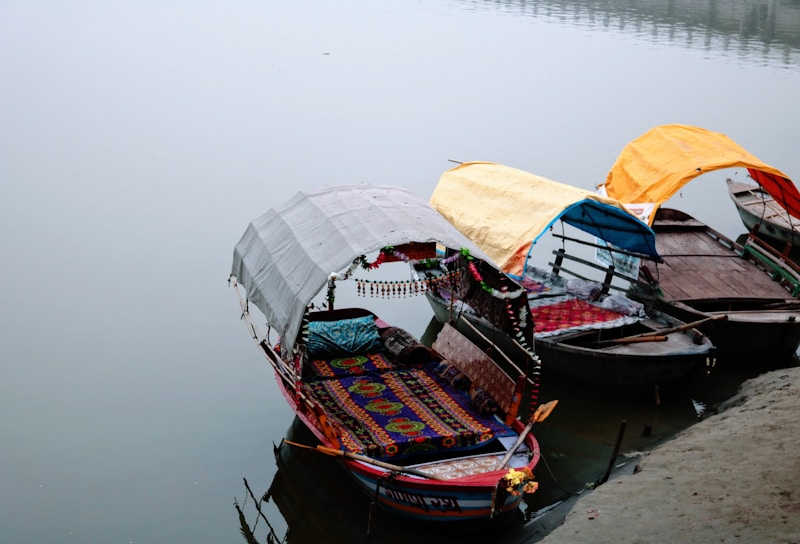Podcast Beta
Questions and Answers
Which of the following aims of the Indian National Congress focused primarily on education and awareness within the populace?
What was a key characteristic of the 'Moderate' leaders during the period of 1885-1905?
How did the Moderates differentiate themselves from the Extremists in the early twentieth century?
Which of the following objectives was not part of the initial aims of the Indian National Congress?
Signup and view all the answers
Which group of leaders is recognized for their staunch belief in 'liberalism' during the early years of the Indian National Congress?
Signup and view all the answers
What was a primary focus in the development of Indian nationhood as aimed by the Congress?
Signup and view all the answers
Who among the following is not typically associated with the early Moderate leadership of the Indian National Congress?
Signup and view all the answers
What was the primary purpose behind the formation of the Indian National Congress according to modern Indian historians?
Signup and view all the answers
Which prominent leader is NOT mentioned as one of the key figures in the Indian National Congress?
Signup and view all the answers
Kadambini Ganguly's address to the Congress session in 1890 was significant for which reason?
Signup and view all the answers
How did the extremist leaders like Lala Lajpat Rai view the Indian National Congress?
Signup and view all the answers
Which of the following statements reflects the 'safety valve' theory regarding the Indian National Congress?
Signup and view all the answers
What was the primary criticism directed at British bureaucrats by the Indian leaders regarding their salaries?
Signup and view all the answers
Which of the following leaders was involved in widening the scope of constitutional demands in India?
Signup and view all the answers
What significant transformation did the nationalists achieve with the British councils?
Signup and view all the answers
Why did the nationalists' movement struggle to include the masses?
Signup and view all the answers
Which argument was NOT used by Moderates in their campaign for the Indianisation of government service?
Signup and view all the answers
What was the outcome of the nationalists' efforts to criticize government policies?
Signup and view all the answers
What key aspect did the Indian nationalists focus on during their political campaigns?
Signup and view all the answers
Which of the following statements best summarizes the intentions of the British regarding the councils?
Signup and view all the answers
What were the moral grounds for the Indianisation of government service posited by the Moderates?
Signup and view all the answers
What was one of the main provisions of the Indian Councils Act 1892 regarding the composition of the Imperial Legislative Council?
Signup and view all the answers
What significant limitation was imposed on the budget discussions within the councils established by the Indian Councils Act 1892?
Signup and view all the answers
Which group had the power to nominate non-official members to the Indian legislative councils as per the Indian Councils Act 1892?
Signup and view all the answers
What was one of the slogans used by early nationalists demanding constitutional reforms?
Signup and view all the answers
What was the key demand of the early nationalists regarding the composition of the Legislative Councils?
Signup and view all the answers
How often did the reformed Imperial Legislative Council meet annually as per the Indian Councils Act 1892?
Signup and view all the answers
What was the identified criticism of the reforms made by the Indian Councils Act during Congress sessions?
Signup and view all the answers
Who had the authority to recommend members for the Indian legislative councils?
Signup and view all the answers
What was a significant outcome of the early nationalists' dissatisfaction with the Indian Councils Act 1892?
Signup and view all the answers
Which group primarily criticized the reforms made by the Indian Councils Act during sessions of the Congress?
Signup and view all the answers
What was the two-pronged methodology of the Moderates aimed at achieving?
Signup and view all the answers
Which method did the Moderates primarily employ to present their demands to the government?
Signup and view all the answers
What was the main focus of the British committee of the Indian National Congress established in London in 1899?
Signup and view all the answers
Who among the early nationalists is known for advocating the 'drain theory' regarding British exploitation?
Signup and view all the answers
What belief did Moderate leaders hold regarding India's political connections with Britain?
Signup and view all the answers
What was the primary reason for postponing the Indian National Congress session planned in London in 1892?
Signup and view all the answers
Which of the following best describes the approach of the Moderates toward British rule?
Signup and view all the answers
What was the primary goal of Moderate nationalists like R.C. Dutt and Dinshaw Wacha?
Signup and view all the answers
What did the Moderate leaders believe was necessary for their demands to be conceded by the authorities?
Signup and view all the answers
Which significant aspect of British rule did the 'drain theory' highlight?
Signup and view all the answers
Study Notes
Aims and Objectives of the Indian National Congress
- Established to create a democratic nationalist movement in India.
- Aimed to politically educate and engage citizens across the country.
- Sought to unify people through shared economic and political demands.
- Fostered relationships among nationalist leaders from various regions.
- Promoted an anti-colonial ideology and nurtured a sense of Indian nationhood.
Era of Moderates (1885-1905)
Important Leaders
- Key figures: Dadabhai Naoroji, Pherozshah Mehta, D.E.Wacha, W.C.Bonnerjea, S.N.Banerjea.
- Influenced by liberalism and moderate politics; distinct from extremist nationalists.
Moderate Approach
- Emphasized lawful constitutional agitation and orderly political progress.
- Critically engaged with government policies, aiming for self-governance similar to Canada and Australia.
- Transformed legislative councils into platforms for discussing grievances and advocating public finance issues.
- Despite gains, failed to include broader masses, including women, in the movement.
Campaign for General Administrative Reforms
-
Advocated for the Indianisation of government service:
- Argued it was economically sensible, citing high salaries of British officials.
- Political argument focused on the economic drain due to remitted salaries and pensions to Britain.
- Morally argued that discrimination against Indians in public service roles was unjust.
-
Moderates believed that public pressure would lead to gradual reforms from the British government.
-
Employed strategies like petitions and meetings for advocacy; established a British Congress committee in 1899.
Contributions of Moderate Nationalists
Economic Critique of British Imperialism
- Introduced the "drain theory" explaining British exploitation of Indian resources.
- Proposed criticisms aimed at illuminating the economic impacts of colonial rule.
Indian Councils Act 1892
-
Main Provisions:
- Increase in non-official members in legislative councils.
- Budgetary discussions permitted, but voting and amending the budget were restricted.
-
Limitations:
- Officials maintained majority, rendering non-official voices ineffective.
- Severe criticisms from Congress members highlighting dissatisfaction with the constraints on true representation.
Indian National Congress: Foundation and the Moderate Phase
- Formed in 1885 under A.O. Hume, aimed at creating an all-India political organization.
- First session held in Bombay with 72 delegates, presided over by Womesh Chandra Bonnerjee.
- Established as an annual event to represent various regions of India, fostering a unified nationalist effort.
The "Safety Valve" Theory
- Some believed the Congress served as a means to release public discontent without direct rebellion.
- Early leaders debated the organization's role, with Marxist historians positing it as a planned diversion from uprisings.
- Modern historians assert that the Congress represented a genuine political awakening among Indians, seeking to address their demands.
Studying That Suits You
Use AI to generate personalized quizzes and flashcards to suit your learning preferences.
Description
This quiz explores the foundational aims and objectives of the Indian National Congress in its early stages. Understand the movement's goals to educate the populace, foster unity among nationalists, and resist colonial rule. Test your knowledge on this crucial part of India's modern history.




